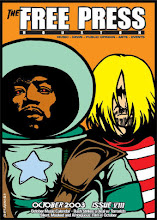High concept vs. low concept

Don't confuse Flash of Genius with anything but a small heartfelt effort that pays off, not in bank dividends, but in the kind of feel good fuzzy thoughts that inspirational movies are made to deliver. Director Marc Abraham is known more for the dozens of Hollywood films he's produced over the years and he steers the film steady, surely and slowly. Flash of Genius stars Greg Kinnear as Bob Kearns the guy who invented the intermittent windshield wiper and then spent his adult years until his hair turned grey suing Ford Motors after they took credit for his invention.
Flash of Genius is a low concept film, there's nothing hidden and what you see in the trailer - one person taking on corporate giants - is what you get. Another example of a low concept film is the documentary Chris & Don: A Love Story, a linear account of the relation between British writer Christopher Isherwood and his partner 30 years his junior Don Bachardy. Isherwood died in 1986 and Don's now in his senior years himself. The best reason to see the film, other than if you're a fan of English literature, is the 16mm home movie footage that Isherwood shot, in the 50s and on, in locations like the set of the movie Rose Tattoo (Tennessee Williams, Burt Lancaster, Anna Magnani). Chris & Don is candid and unabashed.
Moving to high concept requires more suspension of belief and often involves mixing genres if not metaphors. Blindness is based on a novel by Nobel prize winner José Saramago, with a screenplay by Canadian director Don McKellar (who also plays the film's most pathetic character), and direction by Fernando Meirelles (whose debut City of God is still one of the great cinematic achievements of this decade). Meirelles either presents a milky white screen or a series of high contrast images. When a viral epidemic sweeps the world making people lose their sight the blind are herded into detention camps. The situation goes from bad to worse as the detainees are shot if they try to leave and left to fend for themselves.
Eventually one ward of the blind goes to war with another ward and the battle involves food and survival as dignity has already been abandoned. After a while the blind notice that the gates are no longer guarded and the third act of Blindness spills out into their Metropolis now empty save for the sightless bumping into each other and immovable objects.
Meirelles makes sure we feel the pain of bruising our knee (The audience seemed disoriented when they were getting up to leave during the end credits.) and the hopelessness of trading sex for food after you haven't eaten for days. The whole movie takes on the semblance of science fiction with the feeling of a future society in the upheaval of abandonment and anarchy.
Another high concept film, and frankly until it introduced the sci-fi element about halfway through I was not into it, is Eagle Eye. The pairing of D. J. Caruso and Shia LaBeouf gave us the Hitchcock inspired (Rear Window) Disturbia and sure enough Eagle Eye starts out in the Hitchcock mode of The 39 Steps or North by Northwest with Shia on the run after being confused with the real bad guy.
Eagle Eye has its share of over the top moments including Billy Bob Thorton playing the kind of federal agent who always gets his man that rings of Tommy Lee Jones in The Fugitive and endless explosions that would take out a city block yet leave the hero unscathed. But then Caruso plays his trump card. This isn't a retread of Enemy of the State but a re-imagining of Colossus: The Forbin Project a really cool 1970 film about computers taking over the world. It seems a top secret project involving a super computer that can monitor the entire nation has decided that the current administration cannot be trusted and plans to assassinate the President and the next ten officials in succession to the highest office of the land. At this point Eagle Eye had my full attention.
If there's a lesson it's that when going high concept go full steam all the way.













